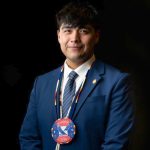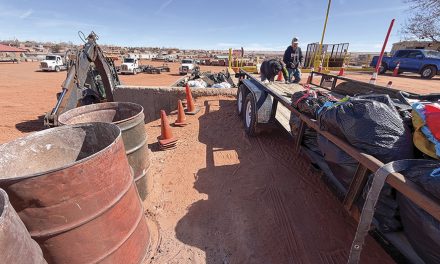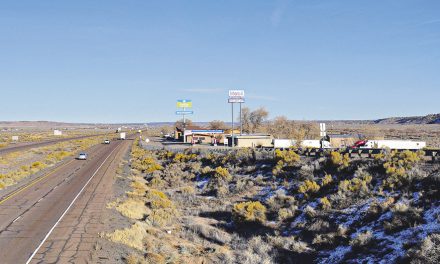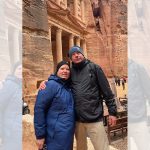
Letters: ‘Pocahontas’ should not be an insult
There have been many times when President Trump has used harsh names to insult someone. One such insulting name is “Pocahontas.” Trump has used this racial slur to describe a female senator.
Although Trump used this term to belittle this senator, I was the one offended. I am a Native American woman from the Navajo Nation, a tribe that has survived genocide and cultural assimilation. Additionally, we are a matriarchal society and I was raised by a generation of strong women. Now is the time I become strong. I didn’t like how Trump used the term “Pocahontas” to describe a woman.
I felt his attack was an attack not only against me, a Native American woman, but also an attack against strong women.
In present-day America, where women are continually seeking equality, where the color of your skin can mean a life of privilege or a life of inequality and injustice, this is the wrong time to insult any woman. Also, in present-day America you can find alarming statistics on violence against Native American women.
You’ll find that half of Native women experience sexual assault and are murdered at a rate 10 times higher than the national average. You’ll also see the high numbers of missing Native women. Yes, we indigenous tribes are resilient, but we are still suffering from racial injustice daily, especially our strong Native women.
With these sad statistics, I am deeply insulted that a U.S. president would continue to use the name of a strong indigenous woman to insult someone based on their race. It communicates that he sees Native women as lesser and endorses their mistreatment.
I stand with strong Native women and sincerely request that anyone reading this will think twice before they begin or continue to use the president’s racial slurs, especially those aimed at Native communities, who are constantly experiencing racial injustice and have suffered far too long at the hands of a white president.
Crystal Kelly
Ignacio, Colo.
(Hometown: Leupp, Ariz.)
Response to all the hemp jíní
Amidst the mass controversy in the past months, I feel obligated to share with the public not only my opinions, but also personal experiences related to Mr. Dineh Benally and his hemp farms. I already know this will stir up the already boiling pot, so to speak, but so be it.
I first met Mr. Benally in the beginning of May, and yes, I am an employee and proud of it. I hadn’t worked in five years due to severe anxiety disorder. My first day I was a nervous wreck, but I worked my butt off and enjoyed every sweat-pouring minute.
There has been a tremendous amount of gossip that I’ve heard and read that makes me laugh and angry at the same time: the pay, the Chinese, the coronavirus, etc. Let me just say that everything I have to say I’m choosing to say, not being paid, forced, or bullied.
Sure the pay isn’t the greatest, but I feel privileged to be able to earn an income today while millions of Americans are relying on unemployment, government assistance, or no income at all. I am able to pay my bills and buy things needed while neighbors may not be able to. Might I add, Mr. Benally pays every week, and usually throws in an extra $10 to $20 for gas money. I’ve never had a boss care about how much fuel was in my tank.
The next topic of gossip I keep hearing about is “the Chinese.” Here’s where I’m going to anger a lot of people, but I’m just speaking the truth, so forgive me ahead of time for my honesty. There are many Navajos employed on the farms. There could be more. Anyone willing to work hard in the heat for 10 hours a day can. I guess I should share that sadly I am not Navajo, married to one, nor am I racist.
It’s the Navajo individual’s own fault if they choose intoxication over farm work or just plain old laziness, surely not Dineh Benally’s fault. I’m not being judgmental, just observant. And to read that the trash alongside the roads is being blamed on Chinese is just crap and everyone knows it. How many years have Navajos littered their booze trash out their car windows? I’ve witnessed it several times. They’re the ones not caring.
How can I prove it’s Navajos? Do some research on the local bootleggers and see what they sell. Guarantee you will see a connection and I can guarantee bootleggers are not selling to the Chinese. I work alongside the Chinese daily. We can’t communicate much, but I can say that you will receive dozens of warm smiles and greetings daily. The funny thing about kindness is it’s contagious even more than hate and racism.
Another fact about the Chinese is they are extremely hard workers dedicated to excellence. That is why you will never see a poor Chinese person. Instead of being so hateful about people you know nothing about, we all should be taking notes from them. I’ve heard many times lately that it would take three Navajos to do the work of one Chinese.
True! Whose fault is that? Certainly not Dineh Benally or the Chinese. Yes, it’s easy to point fingers. Also the truth hurts, not racist comments and surely not the fabricated crap I’ve read over and over from members of the Navajo Nation. I’m sick and tired of the outlandish horror stories that you adults are creating with no evidence, just hearsay, which brings me to the next bit of gossip I can’t wait to clarify: “The farms are swarming with COVID-19.”
Where do you people get your information? There isn’t anyone here sick. It’s a hemp farm, not a zoo. We are capable of and have been practicing the same precautions and health measures as everyone else to stay well. If you ask my opinion, the spread of the virus can be blamed on the regular drunk crowd that hangs around City Market and bootleggers.
Hemp is essential for many uses and remedies. Just the other day I discovered another new product I love and is very important for this area: insect repellent for mosquitos, ticks, and flies. For all the animal lovers out there, how many of you use pesticides, such as Raid, in the proximity to your beloved fur babies? I bought this at City Market for obvious reasons … I hate flies, mosquitoes, ticks, and I also hate poison.
For all you hemp haters, the main ingredient is hemp seed oil, safe to apply to you and your pets. But this industry is so bad, right? Do your research people. It’s time to face the facts. The world needs hemp. Now is the time for criticism, but I don’t care because I’m true to myself and my beliefs.
Melissa Scott
Shiprock, N.M.
Young people, be counted and vote!
Yá’át’ééh shik’èí dóó shidine’è. I write this to you on National Voter Registration Day and I hope you have already registered to vote, but if not, I want to share with you some really great reasons why you should vote.
I know that some, especially our youth, often question why they should bother voting when it seems like elected officials so often ignore the needs of our community. Especially now, when our planet is burning and our people are being so adversely impacted by COVID-19, while politicians far away in Wáshindoon continue to deny the existence of climate change and fail, miserably, in leading our country through this pandemic.
However, take heart shidine’è. Because of the tremendous work of those who have come before us, we the Diné people are here, and we are able to impact American politics in a profound way, including for the incredibly important purpose of closing the equity gap between our community and off-reservation communities.
Registering to vote is often criticized by some of our more politically astute youth as a way of buying into an illegitimate colonial system, and essentially succumbing to and accepting this unjust yoke.
However, I want to challenge that assertion. I’m not asking you to accept the American system; I’m just asking that you ensure that this system that we are shackled with is as just for and as compassionate to our people as possible. The reality is that, until American laws become more just and human rights-based and formally recognize the inherent sovereign right of our Diné Nation to full international self-determination and self-governance, our nation will continue to exist within the legal framework of the United States, and we will remain reliant upon that government to provide our people with public governmental resources.
Those resources should include safe and easily traveled roads so our kids can make it to school easily, so we can make it to work easily and safely, and so emergency medical teams can make it to our elders and our sick in a rapid manner when assistance is needed.
Those resources should also include reliable, functional and effective cellphone and Internet service so our people can call first responders for assistance when they need it, and so our children can have access to learning and our entrepreneurs can have access to online marketplaces.
Of course, it also means our people should have access to very basic governmental infrastructure that would make running water and electricity available in every home on our nation so that our people can enjoy developed nation living conditions like everyone else in this country.
COVID has shown us how detrimental it is to ignore the gap between our public governmental resources and those of others in this country, and how imperative it is that we raise our collective Diné voice and demand, as loudly as possible, that the unjust equity gap that exists between our community and the rest of America be closed, immediately.
But shi yazh, we cannot do this as a people without your voice joining this chorus. You are an essential component of our community, and you are also the strongest sector of our community, both in your sense of what is right and just, and in your strength in numbers.
Based on a very rough estimate from the 2010 Census data, over 34,100 of our tribal members living on the Navajo Nation are eligible voters age 30 and below. I hope each one of you is registered to vote. My understanding is that there are approximately 35,000 Native American eligible voters in Arizona who are not registered to vote. Let’s make sure those voters are not Diné.
For too long federal governmental funding to our community has been inadequate and this has been much to the detriment of our people. As the gap between the rich and the poor in America in general widens, the inequity of our situation on the Navajo Nation has reached an untenable level, and in a cruel twist of fate our own people are paying the price for this — with their lives. This is not acceptable by any standard and we need to do something about it.
You need to do something about it, shi yazh. The easiest thing you can do to close this gap and make our people less vulnerable to COVID-19 and other pandemics is vote.
Indeed, your vote also can help our community’s response to climate change, which threatens to make our community uninhabitable, due to extreme temperatures and weather conditions in an environment where electricity sadly often doesn’t exist to ease livability.
The reason your vote can help is because when a community forms a voting block — and Navajo Nation has a very strong voting block in all the state and federal jurisdictions into which our great nation extends — that community gains political power. That power vests that community with a voice that politicians cannot ignore.
So if we want to raise our Navajo voice loud and demand that politicians in Wáshindoon ensure developed nation living conditions for our people — many of whom have served in disproportionate numbers to defend and protect this country that has for too long turned a blind eye to our basic human needs — you must vote.
If you are still not convinced, I can do nothing but now implore that you please, please register to vote so you at least have the option to cast a ballot on Nov. 3, if you feel comfortable doing so. So much has happened in the last four years to threaten American democracy, which was an imperfect and unjust system to begin with. Yet that system has incredible potential to be perfect and just, given the founding American ideals, which are themselves indigenous ideals (the colonists learned the concept of democracy from our Six Nations brothers and sisters).
So please, for the sake of our Diné community, and to preserve the opportunity to close the equity gap that our people struggle to survive through each day, now more than ever, please add strength to our Diné voting block so that our collective voice may be heard in Wáshindoon, and so our peoples’ daily needs will have a chance of being met through the massive investment of public funds that will be needed to ensure that our children and our elders have equal access to the basic governmental infrastructure that other Americans enjoy.
And if you have not already done so, please also fill out your census registration form. That is the mathematical basis for how federal governmental dollars are divvied up and distributed to communities in this country. Without you and your loved ones being part of this count, our community automatically gets cut short on the baseline federal funding that Wáshindoon is willing to send our way.
Ahéhee’ shikéí dóó shidine’é for hearing me out. Please file your census registration by Sept. 30 (this can be done easily online) and register to vote by Oct. 5 in Arizona, Oct. 6 in New Mexico, and Oct. 23 in Utah (this can also be done easily online).
Ethel Branch
Kinlani, Ariz.
Suspend approval for drilling near Chaco
While the Navajo Nation continues fighting an unprecedented public health crisis against COVID-19, special interest groups with the support of the federal government are moving forward with plans to open our ancestral Navajo lands to industrial oil and gas drilling.
This despite the fact that Navajo and other tribal voices are still not able to fully engage in the process due to ongoing pandemic restrictions and barriers to broadband Internet access on the reservation.
Our relationship with the federal government has rarely worked in our favor. The U.S. Bureau of Land Management’s current efforts to push forward their drilling plans for the Greater Chaco region of New Mexico are just the latest example. Four generations of my family have endured the repercussions of resource extraction on Navajo lands.
We’ve paid a heavy price with our health and our lives. Some of my mom’s earliest memories with her siblings were welcoming my cheii (Navajo for grandfather) home after a long day in the uranium mines.
They would help him take off his boots and work clothes, which were covered with toxic dust and residue from the mines. She remembers playing in the trailing ponds and entrances of the uranium mines when they would visit my cheii at work.
My cheii and many other Navajo men during that time would take any work he could find to provide for his family of 10. The mining companies that employed these men never informed them of the immediate and long-term health implications related to this work. Unfortunately, my cheii died one month after I was born of severe complications related to his exposure to uranium.
My family’s story is not uncommon on the reservation. There’s a deep and traumatic tear in the fabric of our family that has had generational impacts. It terrifies me that my three children still carry the burden as traces of uranium still run through their veins.
Even to this day, many of the abandoned mines remain out there, un-cleaned, exposed, and reminding us that from uranium to coal, and now from oil to the natural gas fracking boom, the special interests that come to bleed natural resources from Dinétah care about profits, not our people.
Navajos in the Greater Chaco region know this well. Since 2013, BLM has approved hundreds of new wells on our ancestral homelands. Now, the BLM is pushing a new plan that would substantially increase drilling. When that plan was released at the end of February, a public comment period was set in motion.
Fortunately, tribal and congressional leaders demanded an extension to this process. While BLM issued a 120-day extension, our communities and our country still grapple with a global pandemic.
They are pushing a “virtual” process that compromises our legal right to participate in this process as many on the reservation cannot participate remotely because it requires a broadband Internet connection, which many households on the Navajo Nation do not have.
It will be the Navajo people who will shoulder the burden of increased air pollution, truck traffic, and industrialized development and they must weigh short-term economic gains for some versus generational impacts for all, their opinions and concerns matter.
Navajo Nation and leaders across New Mexico in tribal, state, and federal governments have delayed this process until Sept. 25. But, until the COVID-19 crisis is managed, BLM should cease the process. As I think about my cheii, my children, and future generations, I add my voice to those calling on BLM to suspend this process.
Charnelle Sherman
Kayenta, Ariz.
Hemp supporters’ arguments don’t hold up
This is in response to the Shiprock Pro-Hemp Rally radio forum that took place on Sept. 18, 2020. The radio forum had several illegal hemp supporters provide their view of illegal hemp farming.
Not one of the pro-hemp supporters indicated how and where the illegal hemp came from and the reason why they believe it benefits the Navajo community. The U.S. Food and Drug Administration states that hemp has not proven to have any medical benefits other than recreational usage.
One pro-hemp supporter acknowledges that there is no current hemp regulatory system in place with the Navajo Nation, but yet disobeys the nation’s law and continues to cultivate illegal hemp.
Another supporter spoke about the job skills she learned from illegal hemp farming. I’m glad she learned a skill to enable her to find a better job opportunity elsewhere, possibly at Navajo Agricultural Products Industry in the near future. Another supporter, an elderly grandmother, talked about how she began using the illegal hemp gummies to remedy her aches and pains. I’m under the assumption Grandma is getting a little too high off of the hemp gummies.
Another supporter ranted on, verbally criticizing individuals such as the Gadii’ahi and Shiprock chapter coordinators for speaking out on behalf of their communities. He also went on making harsh comments about the Arizona Public Service workers and their children.
First of all, again, it is illegal to grow, cultivate, possess, develop, and propagate illegal hemp on the Navajo Nation; it’s written in the nation’s legislation. And according to the 2018 U.S. Farm Bill, any tribe or state who wishes to grow hemp has to apply for approval through the USDA. Dineh Benally’s hemp application has been denied and returned. Dineh Benally does not speak on behalf of the Navajo Nation.
He should be aware of the Navajo Nation ethics as a political official. So why are the illegal hemp farmers still growing hemp? Some of the pro-hemp supporters have worked within the Navajo Nation government or other governmental entities and are sufficiently knowledgeable to understand how to follow laws, rules and regulations.
It’s as simple as you can’t drive a car without the engine or tires. Same concept: You have to ensure that you follow the rules and regulations. If we don’t have laws, our world would be very chaotic. The chapter coordinators are individuals who work in the best interest of their chapter community, which means they keep in mind the community’s health and safety at the forefront.
So, if their community’s safety is being jeopardized, they will speak up on behalf of their communities. To belittle the hard-working men and women at APS is an all-time low.
The APS workers are highly skilled, intelligent and a talented workforce. To belittle their children is not right to say in a radio forum.
The illegal hemp farming has brought nothing but disharmony and chaos to the Navajo Nation among families, relatives and friends. It has brought destruction and violence to our community members. An example is the illegal hemp security guard manhandling an elderly grandmother and her grandchildren. We even have Anglos becoming involved in bullying our community members off their own Navajo Nation farmlands and rights to the water. These Anglos even use vulgar language and gestures to our community members.
Does this sound familiar? Have we gone back in time to the cavalry invading our Native lands? The foreigners continue to make their way to the illegal hemp farms regardless of the temporary injunction. They have no respect for the Navajo Nation laws.
The “Boss,” Dineh Benally, has lost all control of the foreigners, as they continue their illegal hemp operations by entering into the farmlands at night. The pro-hemp rally speeches justify the continued bullying and intimidation tactics they utilize to try to get their way without following the laws of the nation. This is all due to one person’s greed and he brought chaos to the Navajo Nation.
Malinda Notah
Gadii’ahi, N.M.
Hemp is good, but Benally took wrong tack
The hemp fiasco of 2020 will go down as a dark footnote in Shiprock history, at least as the story has unfolded thus far. Many of us agree there is a positive side to hemp with great beneficial potential. It has medicinal value and is a base component in the manufacture of many useful everyday products. It is incumbent upon the Navajo Nation to make appropriate amendments to the law, regulate hemp cultivation and facilitate the capitalization of the potential.
The hemp cultivation would need to be done in a way that is agreeable to the community and appropriately “accepted” in the tribal cultural and herbalistic realms. The production and manufacturing of the hemp end products should be established here on the Rez, with Navajo preference employment.
The hemp cultivation needs to be put in the hands of Navajo entrepreneurs and not just tribal enterprises. Generally, our Dinétah lands need to be available and less restrictively to those with vision to create business opportunities to provide for our families and the communal good.
My shi tsili (clan brother) Dineh Benally did not do the thing right. He took advantage of an unclear situation and aggressively “took the law into his own hands.” He disrespected the community by developing a massive deal in which we got little or no consideration with his self-serving manipulation of his farm board position, questionable land lease arrangements, making noxious hemp smells and bringing in migrant workers.
His actions caused criticism and division in Shiprock, igniting protest marches, near-violent confrontations, destruction of property and reports of gunfire. Unfortunately for him the matter ended up in the adversarial Navajo court system where he lost big. The protest activities gave opportunity for people to voice their frustrations, emphasize the value of our civil liberties and the need to care for the land with the proper usage of our precious farmlands and water. Protests and marches are ordinarily valuable and critical to influence policy and creation of law.
The hemp protests may or may not have influenced the court; it is doubtful, as the integrity of the court demands that it not be influenced by public opinion, that its ruling be based on the letter of the law. Personally, I was criticized for not speaking out to oppose the hemp operation. I believe I was being cognizant of the protocol that matters under litigation should not be subject to debate by public officials.
Because of my position or non-position, it appears I have lost some good friendships and support. That is regretful to me. It has also strengthened the cause for criticism by my political detractors and adversaries. That is fine, as that comes with the turf. There has been direct and collateral damage, there are lessons learned, refined plans.
Even so and above all we are resilient and we persevere, as we move past this point in our history refocused to do our part to secure a reasonable and comfortable survival for our grandchildren and future generations.
Duane “Chili” Yazzie
Shiprock Chapter President
Shiprock, N.M.
Hemp is not illegal on Navajo
I am a 72-year-old Dineh who grew up on the Navajo Reservation. I left for higher education schooling after I graduated from high school. I have since lived and earned my living off the reservation. In the intervening years I have worked for the Navajo Nation — which ended up with an experience that others will say was harsh treatment at the hands and decision of my Navajo leaders. I accepted expulsion from the Navajo Nation and from that experience, my true character was tested.
I had to earn a living to feed my family, which was not easy to do. I started and managed my own business. I am thankful for the harsh experience that I endured because I discovered I can do for myself and not to depend on anyone. In the last 40 years I gained practical experience in business, economics and higher education.
It is in this spirit that I respectfully ask you not to pass Legislation No. 0222-20. There are already two laws that are good enough and understandable to allow any Navajo who desires to do industrial hemp farming. It is an opportunity just waiting there to be worked and for many Navajos to earn a decent living and even to pay taxes so that many other Navajos can receive benefits. The Navajo Nation Council has already debated and determined the merits of industrial hemp production and thus “decriminalized” it under the Navajo Nation Code, Title 17.
Navajo Nation law already explicitly exempts hemp (a plant that contains less than 0.3 percent THC) from being illegal. It is not illegal. Under the 2018 Farm Bill, the U.S. government approved hemp as a legal product to be regulated by the states and tribes. Individual farmers across the United States are allowed to produce hemp because it is not illegal.
Currently, the U.S. Department of Agriculture is responsible for monitoring, implementing and guiding the development of hemp production among the states and tribes. Thirty-five tribes have approved systems with many applications pending. Every state, all 50, have applied and as of today, 23 states have approved systems.
Individual farmers in these tribes and states are farming hemp. It is not marijuana. The federal government knows that, states know that, and forward-thinking tribes know that.
The Navajo Nation Council needs to create and establish the regulatory system, which has been done for 35 tribes and 23 states already, with many others pending approval. These systems provide for testing of the plants and if a crop fails and is above the 0.3 percent THC, the systems provide for disposal, reporting, fines for non-compliance. The systems are civil systems because hemp is not an illegal controlled substance like marijuana. The Navajo Nation has determined that hemp can be grown on the Navajo Nation. NAPI has been given an exemption to grow it. It is not illegal to grow hemp on the Navajo Nation.
Any regulatory system of hemp should be under our civil code through the Department of Agriculture. It does not belong under the criminal code. The criminal code already addresses hemp. Again, it already says that a plant with less than 0.3 percent THC is not “marijuana.”
There is no controversy. The Navajo Nation Council already determined that. It has approved hemp as legal to grow. Legislation No. 0222-20 has legal language that is complicated to understand for a common person. The current law defines hemp at any plant with less than 0.3 percent THC content. Above that 0.3 percent THC is defined as marijuana. This is easy to understand and easy to test for any farmer to comply under a responsibly developed regulatory system as provided by the U.S. Department of Agriculture.
I am afraid that with the speed at which this legislation is moving through the legislative process, it is moving more on emotions and misinformation rather than by sound and factual reasoning and facts.
I believe you are capable and intelligent leaders to take pause of this fast-moving legislation, but instead to approach NAPI to complete their assignment quickly, fashion the rules and regulation that is simple to understand, and simultaneously to educate the people about the positive and negative aspects of industrial hemp farming. In its absence you will continue to experience the uproar that pits Navajos against Navajos that is not healthy, and it can only lead to destabilization of a good thing from going smoothly.
I firmly believe that industrial hemp farming and manufacturing industry thereof can give us a tremendous boost to our impoverished nation, help our health and well-being, and lead to reclaiming the desertification of Navajo lands. Many tribes across the U.S. are industrial hemp farming without having to burden it with controversy and misinformation. The local disputes should not be allowed to unilaterally determine the future of this tremendous opportunity for all Navajo people.
Al Henderson
Albuquerque, N.M.








 Highway 264,
Highway 264, I-40, WB @ Winslow
I-40, WB @ Winslow